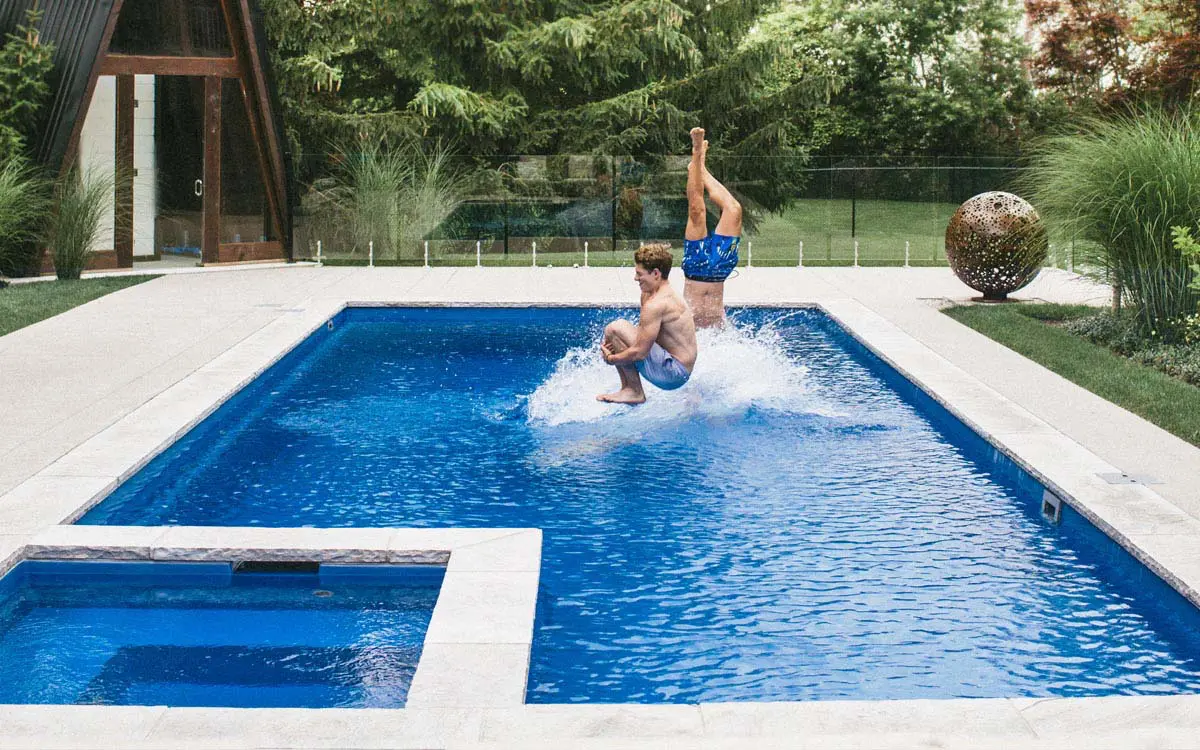
Salt Water Chlorinator: Perfectly Suited for Fiberglass Pools
Introduction
Have you ever wondered if there’s a better way to keep your pool water clean without relying on harsh chemicals? Many pool owners are making the switch to salt water chlorinators, drawn by their convenience, cost-effectiveness, and luxurious swimming experience. In fact, over 75% of new pool installations now incorporate salt water systems—a testament to their growing popularity.
Imagine stepping into your pool and feeling the silky-smooth water against your skin, free from the strong smell of chlorine. Unlike traditional pools that require frequent chemical adjustments, salt water pools maintain a steady chlorine level, reducing fluctuations and making pool care simpler than ever.
However, not all pools are equally suited for salt water systems. Fiberglass pools stand out as the ideal choice, offering durability, resistance to salt corrosion, and minimal maintenance requirements. In this guide, we’ll explore:
- What a salt water chlorinator is and how it works.
- Why fiberglass pools are the best match for salt water systems.
- How fiberglass compares to concrete and vinyl pools.
- The benefits, cost savings, and ease of maintenance of a salt chlorine generator.
If you’re considering a salt water pool, this article will help you understand why fiberglass pools are the perfect fit.
What is a Salt Water Chlorinator?
Definition & Functionality
A salt water chlorinator, also known as a salt chlorine generator, is a system that converts dissolved salt into chlorine through a process called electrolysis. This provides continuous sanitation without the need for traditional chlorine tablets or liquid chlorine.
How It Works
- Salt is added to the pool water at a low concentration (about 3,000–3,500 ppm, much lower than ocean water).
- The salt water chlorinator uses an electrolytic cell to break down the salt into chlorine gas, which dissolves in the water to sanitize the pool.
- The system automatically maintains a steady chlorine level, reducing the need for frequent chemical adjustments.
This process ensures that your pool remains clean, clear, and comfortable to swim in—all while minimizing the hassle of traditional chlorine maintenance.
Benefits of Salt Water Chlorinators
Healthier, Softer Water
- Salt water pools provide a gentler swimming experience, reducing skin and eye irritation.
- Unlike traditional chlorine pools, they don’t cause red eyes, itchy skin, or the strong chemical smell associated with chlorine.
- The water feels silky and smooth, enhancing overall comfort.
Reduced Chemical Handling
- No need to store or manually add chlorine.
- Eliminates the risk of chemical imbalances that can cause pool issues.
- Reduces exposure to harsh chemicals, making maintenance safer and simpler.
Cost Efficiency
- While the initial installation cost of a salt water chlorinator may be higher, long-term savings on chlorine purchases make up for it.
- Fewer shock treatments and algaecides are needed, reducing ongoing expenses.
Why Fiberglass Pools Are Ideal for Salt Water
Durability & Resistance to Salt
- Fiberglass is non-porous, making it highly resistant to salt corrosion.
- Unlike concrete, fiberglass does not degrade or weaken when exposed to salt water.
Smooth Surface Benefits
- The smooth, non-porous surface reduces algae buildup, meaning fewer chemicals and less frequent cleaning.
- Requires minimal scrubbing compared to rougher materials like concrete.
Compatibility with Salt Systems
- Fiberglass pools are designed to work seamlessly with salt water pool chlorinators, ensuring long-term efficiency and durability.
Discover our range of fiberglass pools here.
Comparison with Concrete Pools
Why Concrete Pools Are Less Suitable for Salt Systems
- Concrete is porous, absorbing water and leading to faster wear and tear when exposed to salt.
- Requires frequent resurfacing due to salt-induced erosion.
- The rough texture encourages algae growth, increasing the need for additional chemicals and maintenance.
While concrete pools can technically accommodate salt water systems, they require more upkeep and higher long-term costs, making fiberglass the smarter choice.
Comparison with Vinyl Pools
Concerns with Vinyl Pools & Salt Water
- Vinyl liners often contain metal components, which can corrode when exposed to salt.
- The liner may wear out faster, requiring frequent replacements.
- Higher long-term maintenance costs compared to fiberglass pools.
Vinyl pools may be budget-friendly upfront, but when combined with a salt system, the cost of liner replacements and repairs can quickly add up.
Long-Term Cost Savings
Lower Chemical Costs
- No need to purchase chlorine tablets or liquid chlorine regularly.
- Fewer additional chemicals are needed for balancing water chemistry.
Reduced Maintenance Expenses
- Fiberglass pools don’t require resurfacing, unlike concrete pools.
- Algae growth is minimized, reducing cleaning time and costs.
Energy Efficiency
- Some salt chlorine generators include energy-efficient features that reduce electricity consumption.
- Less need for chemical adjustments means less pump and filtration usage, lowering energy costs.
Impact on Pool Water Quality
Clearer, Softer Water
- Salt water pools provide a luxurious swimming experience with gentle, crystal-clear water.
- Reduces eye and skin irritation, making swimming more enjoyable.
Consistent Chlorine Levels
- Unlike traditional pools where chlorine levels fluctuate, salt water systems maintain a steady and optimal balance.
- No sudden spikes or drops in chlorine, ensuring a more comfortable swim.
Environmental Benefits
Reduced Chemical Usage
- Less reliance on chemical additives means a lower environmental impact.
- Fewer chemicals are released into the surrounding ecosystem.
Safer for the Environment & Swimmers
- No need to handle or store hazardous chlorine products.
- Reduces the risk of over-chlorination, which can harm both swimmers and the environment.
Ease of Maintenance
Fewer Algae Issues
- The non-porous surface of fiberglass pools, combined with the steady chlorine production of a salt chlorinator, significantly reduces algae growth.
Lower Ongoing Cleaning Requirements
- Minimal scrubbing compared to concrete or vinyl pools.
- Automatic chlorination means less manual water testing and adjustments.
Salt Concentration Misconceptions
Not as Salty as Ocean Water
- The ocean has about 35,000 ppm of salt, whereas a salt water pool has only 3,000–3,500 ppm.
- The salt level is so low that most swimmers can’t even taste it.
Gentle on Pool Equipment & Swimmers
- Modern salt chlorine generators are designed to operate efficiently without damaging pool equipment.
- The water remains gentle on skin and hair, enhancing the overall swimming experience.
Conclusion
Why Fiberglass Pools with Salt Water Systems Are the Best Choice
- Long-lasting, durable, and resistant to salt damage.
- Provide a superior swimming experience with softer, clearer water.
- Require less maintenance and fewer chemicals, making them cost-effective and eco-friendly.
Final Thought
If you’re considering a pool upgrade or installation, a salt water chlorinator paired with a fiberglass pool offers the perfect combination of luxury, efficiency, and longevity. Get expert advice on fiberglass pools: contact the experts today!

